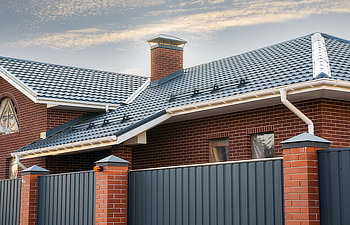
When it comes to choosing the right type of commercial single-ply roofing membrane, it’s important to understand the unique characteristics and benefits of each option. TPO (Thermoplastic Polyolefin), PVC (Polyvinyl Chloride) and EPDM (Ethylene Propylene Diene Monomer) are the three main types of single-ply membranes commonly used in commercial roofing applications. Each type has its own set of advantages and considerations, making it essential to know when to use each one.
TPO (Thermoplastic Polyolefin)
TPO roofing systems are a popular choice for commercial flat roofs due to their single layer of synthetics and reinforcing scrim. These membranes are welded together using hot air and can be mechanically fastened or bonded with adhesive to the insulating layer. TPO membranes provide a durable, weather-resistant barrier that is ideal for commercial roofs. They offer excellent heat and UV resistance, making them suitable for regions with high temperatures and intense sunlight.
PVC (Polyvinyl Chloride)
PVC membranes are another type of thermoplastic roofing membrane that is similar to TPO. They are typically reinforced with polyester or glass-fiber mats or scrim and are welded at the seams with heat or chemical methods. PVC membranes can also be mechanically fastened or bonded to the underlayer with adhesive. Like TPO, PVC membranes offer strong weather resistance and are well-suited for commercial roofing applications in areas with high heat and UV exposure.
EPDM (Ethylene Propylene Diene Monomer)
EPDM is a synthetic rubber compound that is a less popular but time-tested option for single-ply commercial roofing. EPDM membranes are known for their flexibility and can come in various thicknesses to accommodate different needs. They provide excellent weather protection and are particularly effective at retaining heat. EPDM membranes are a good choice for commercial roofs in regions with extreme weather conditions, as they can withstand temperature variations and offer long-term durability.
Choosing Commercial Single-Ply Roofing
When considering which type of commercial single-ply roofing membrane to use, it’s important to take into account factors such as climate, building design and budget. TPO and PVC membranes are suitable for areas with high heat and UV exposure, making them ideal for commercial roofs in sunny climates. EPDM membranes, on the other hand, are well-suited for regions with extreme weather conditions, as they offer excellent weather protection and heat retention.
In addition to climate considerations, the installation method and maintenance requirements should also be taken into consideration when choosing a single-ply roofing membrane. TPO and PVC membranes can be welded at the seams, providing a seamless and watertight barrier, while EPDM membranes are typically adhered or ballasted. Understanding the specific installation and maintenance requirements of each type of membrane is crucial for ensuring the long-term performance and durability of the roof.
Wholesale Commercial Roofing Materials and Accessories
Each type of commercial single-ply roofing membrane has its own unique advantages and considerations. TPO, PVC, and EPDM membranes offer different levels of weather resistance, heat retention and installation methods, making them suitable for different commercial roofing applications.
Mid-Atlantic Roofing Supply sources only the finest-quality commercial single-ply roofing membranes and other products for local roofing supply centers across the United States. Partner with us to get the best and most affordable products and materials for building owners and contractors in your area. Contact the nearest Mid-Atlantic Roofing Supply distribution center to learn more.
Posted on behalf of